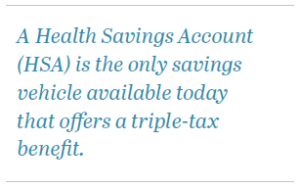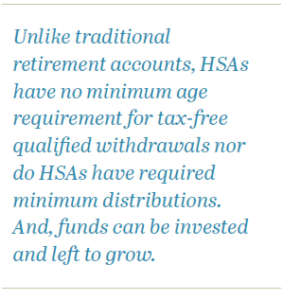Lena McQuillen, CFP® Director of Financial Planning, explores the many ways that Health Savings Accounts (HSAs) can be used throughout your life—including in retirement—to help combat the high cost of health care, and what you should consider and know, from tax implications to beneficiary designations.
It’s no secret: health care costs often rank among the most significant expenses in retirement. A single retiree aged 65 in 2023 may need to have saved approximately $157,500—after tax—to cover health care expenses in retirement, according to Fidelity; for a retired couple, this number is doubled, coming in at a staggering $315,000.1
However, these figures will vary based on factors such as location, longevity, overall health, and types of accounts used to cover expenses—including Individual Retirement Arrangements (IRAs), taxable accounts, and Health Savings Accounts (HSAs). In this issue of the 9:05, we explore the pros and cons of HSAs to help combat the high cost of retirement health care expenses.

Health Savings Accounts (HSAs) have emerged as a popular savings vehicle for health care expenses. An HSA is similar to how a 401(k) plan is used to save for retirement, but is specifically designed for health care costs throughout one’s life. An HSA is a medical savings account that you can contribute to and withdraw from for qualified medical expenses—now, prior to retirement, or when retired. It’s also the only savings vehicle available today that offers a triple-tax benefit.
1. Tax-deductible Contributions: Contributions reduce your federal taxable income, regardless of how high your income. (Note: States will vary on deductibility; currently, residents of California cannot deduct HSA contributions on their state income tax returns.) Employers may contribute to the account on your behalf as well.
2. Tax-deferred Growth: Earnings on your contributions have an advantage of growing tax-free. Funds can also be invested in a brokerage account providing 2023additional flexibility in investment options allowing you to manage growth and risk to invest for the long term. The HSA is yours for life even if you leave the company where you opened the HSA.
3. Tax-free Withdrawals: Qualified medical expenses can be withdrawn tax-free at any time after the establishment of the account. Non-qualified expenses can be withdrawn, but will be taxed as income (Note: There is a 20% penalty in addition to income taxes on non-health care or non-IRS-qualified medical expenses if you are under 65 when you take the withdrawal.)
Contributions and High Deductible Plan Eligibility
To contribute to an HSA, you must also be covered by a high-deductible health plan (HDHP) with no other non-HDHP coverage. In 2024, the maximum contribution limit is $4,150 for singles and $8,300 for families, with a catch-up contribution of $1,000 for those age 55 and older. Additionally, you must cease contributing at least six months prior to enrolling in Medicare to avoid penalties.
For the high-deductible health plan itself to qualify, it must have a minimum deductible of $1,600 for singles and $3,200 for families. The maximum out of pocket allowed for an HSA-qualified plan is $8,050 for singles and $16,100 for families.
Who Does and Doesn’t Benefit from HSAs?
Given the high deductible associated with HDHPs, you might wonder if an HSA is right for you. Generally, HSAs are most advantageous for healthy individuals with fewer health care needs. If you anticipate minimal medical expenses in the near term, maximizing the tax-deferred growth of your HSA contributions can provide a valuable reserve for significant future medical costs.
However, if you have a chronic condition, anticipate frequent health care utilization throughout the year, or expect a major health event such as surgery or childbirth, a high deductible plan and HSA may not be the best option. A lower deductible insurance plan may be a more suitable choice, even if it comes with a higher monthly premium.
What are the HSA Withdrawal Rules?
Unlike traditional retirement accounts, HSAs have no minimum age requirement for tax-free qualified withdrawals nor do HSAs have required minimum distributions. Funds can be invested and left to grow, and you can be reimbursed for a qualified medical expense, even if it happened in the past, provided they were not previously reimbursed or taken as an itemized deduction. The expense must also have occurred between the time when the account opened and when you die.

While the annual contribution limits may not seem sizeable, early and strategic saving can result in significant HSA balances over time, especially if you opt to let funds accumulate rather than immediately reimburse qualified medical expenses. This approach means paying for some of your current medical expenses out of pocket, but can lead to a substantial balance in your HSA account by the time you retire. Considering the high costs of health care during retirement, having tax-free funds available through your HSA can alleviate the strain on your other retirement accounts, allowing them to last longer.
Who Can Inherit and Maintain an HSA?
It is important to consider the post-death rules governing HSAs, especially if you anticipate accumulating a substantial balance that may not be fully utilized during your lifetime. This can have significant tax implications, particularly if your beneficiary is someone other than your spouse.
Should your spouse be designated as your HSA beneficiary, they can inherit the account tax-free and integrate it into their own HSA (or create one if they do not have an existing HSA). However, if the beneficiary is someone other than your spouse, the account loses its HSA status, requiring the entire balance to be withdrawn and treated as taxable income to your beneficiary. Consequently, if your beneficiary is already in a high tax bracket, the taxes owed on the inherited funds could substantially erode its value and potentially push them into an even higher tax bracket.
Preparing For Tax-Efficient HSA Utilization
Considering the potential for significant HSA balances upon retirement, it’s essential to plan for tax-efficient utilization and the management of any remaining balance, especially in the event of your passing. Here are some proactive steps to ensure your HSA is used efficiently:
1. Utilize Funds During Your Lifetime: Actively utilize your funds for qualified medical expenses to prevent excessive accumulation, especially for larger medical expenses before or during retirement.
2. Plan For and Take A “Deathbed Drawdown”: Maintain records of unreimbursed and undeducted qualified medical expenses since the establishment of the account. This documentation will enable you to make an immediate and potentially substantial tax-free withdrawal before your passing, known as a deathbed drawdown. This can become challenging without proper documentation as IRS rules will require you to be able to substantiate any reimbursements. Documents you will want to hold onto include: medical expense receipts, tax records, HSA account statements, itemized bills, and other tax forms to prove the expenses were not previously deducted.
3. Assess Tax Implications of a Non-qualified Withdrawal: If you don’t have records to make a “deathbed drawdown,” consider the pros and cons of making a withdrawal anyway. Evaluate whether you or your designated beneficiary are in a lower tax bracket. If you are in the lower tax bracket, it may make sense to take a non-qualified withdrawal and pay taxes at your income tax rate—especially if you are over 65 and can avoid the 20% penalty.
Exploring an HSA and Retirement Planning Options
Planning for health care expenses in retirement is crucial for financial security and peace of mind. HSAs offer valuable benefits and tax advantages for managing these costs, but they require thoughtful consideration and strategic planning. By proactively utilizing your HSA, assessing tax implications, and preparing for the future, you can ensure that your health care needs are met efficiently and that your assets are passed on effectively to your beneficiaries. Your Bailard Investment Counselor can provide personalized insights and help you navigate the complexities of retirement planning with confidence.
1 “Fidelity® Releases 2023 Retiree Health Care Cost Estimate: For the First Time in Nearly a Decade, Retirees See Relief as Estimate Stays Flat Year-Over-Year”, https://newsroom.fidelity.com/pressreleases/fidelity–releases-2023-retiree-health-care-cost-estimate–for-the-first-time-in-nearly-a-decade–re/s/b826bf3a-29dc-477c-ad65-3ede88606d1c, 7/21/2023.
Additional Sources:
“Fidelity® Releases 2023 Retiree Health Care Cost Estimate: For the First Time in Nearly a Decade, Retirees See Relief as Estimate Stays Flat Year-Over-Year,” https://newsroom.fidelity.com/
“How To Quickly (And Tax-Efficiently) Draw Down HSA Assets,” https://www.kitces.com/blog/hsa-tax-benefits-withdrawal-qualified-medical-expenses-irs-records/, 2/15/2023
“5 HSA Rules You Need to Know – Ed Slott and Company, LLC (irahelp.com),” https://irahelp.com/slottreport/5-hsa-rules-you-need-know/, 4/5/2023
Recent Insights
Quarterly Small Value Strategy Q3 2025
Stocks shot higher in all three months of Q3, propelled by relief that investors’ worst fears regarding tariffs and trade wars did not materialize and increasing confidence that the Federal Reserve (the Fed) would be lowering interest rates soon. In what one Wall Street strategist termed a “flight to crap”, investors—particularly retail investors—flocked to lower quality “junk” stocks. Retail investors’ stock market participation has risen close to all-time highs in recent months, which may help to explain the outsized junk stock performance we have witnessed.
October 27, 2025
Quarterly Technology Strategy Q3 2025
The quarter reflected a firming of technology fundamentals following the broad Q2 market rebound. Underlying fundamentals improved meaningfully across several key verticals, driven by both structural demand trends and evolving regulatory frameworks. Investor focus sharpened on operational scalability, energy efficiency, and the maturing economics of AI deployment—even as early-stage technologies gained traction at the margins. The sector also saw increasing complexity in capital flows, partnerships, and supply chains, reflecting the accelerating pace of innovation and infrastructure build-out.
October 20, 2025
Economic Brief: Gold Rush
From gold to gigabytes, Jon Manchester, CFA, CFP® (Chief Strategist, Wealth Management) draws a line from California’s first gold rush to today’s race for artificial intelligence, exploring the optimism, risk, and reinvention that come with every new boom.
October 14, 2025
Keep Informed
Get the latest News & Insights from the Bailard team delivered to your inbox.